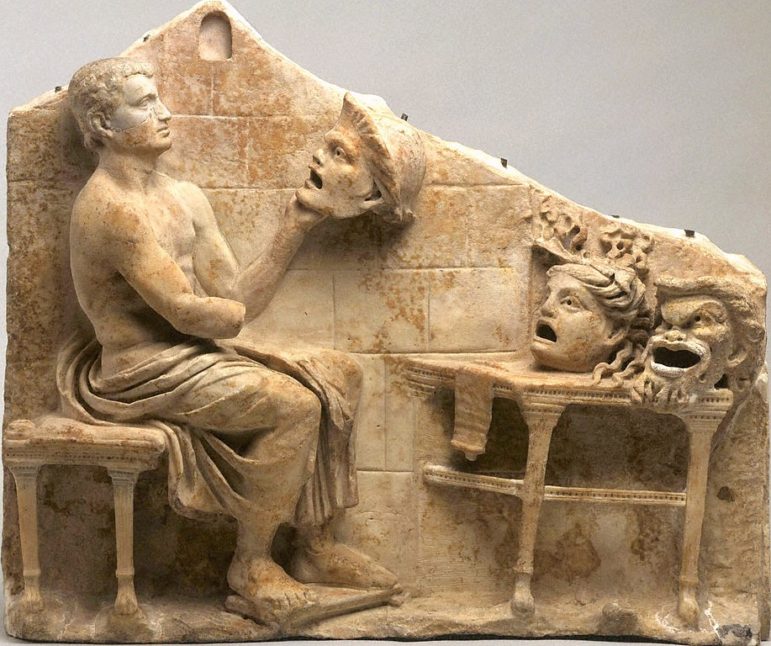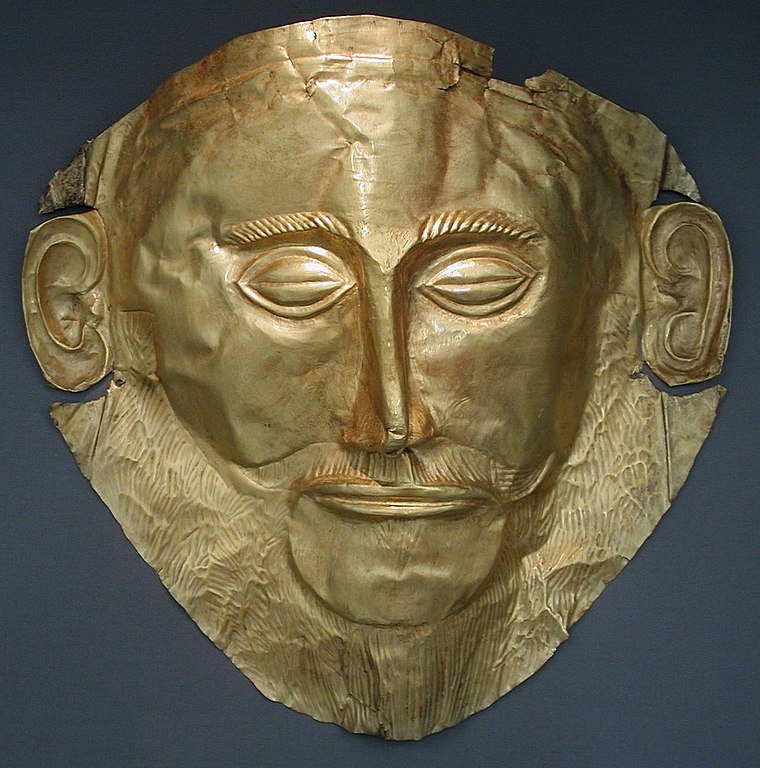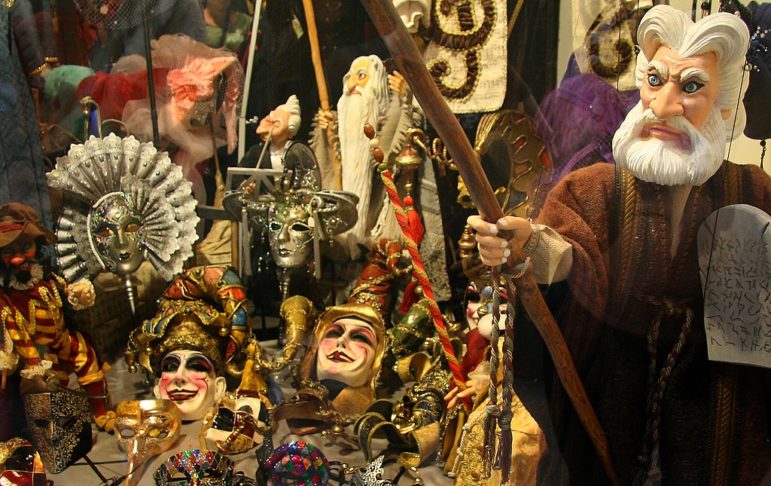
The other day, I hosted a party in my new home. It’s a work in progress, with boxes still piled full of books and long empty gaps that will one day be full of shelves. The only room fit for hosting a large group fills several purposes right now: it is a dining room, an office, but most of all it is an altar room.
As I settle into the house I find myself living most of my life in that space, surrounded by my allies. Hermes near the door, gathering small bright things like a magpie. Athena by the window, firm and steady and unexpected, watching with her grey eyes. The Good Neighbors at the threshold, honey in their cups and hawthorne close to hand. Filling the room with flesh and blood and breath for the first time felt odd – not bad, but crowded.
At least, it did to me. I watched people move and mill, hardly glancing at the altars as they chatted, except to find places to put down their glasses. The closest anyone got to even recognizing their surroundings was an offhand comment. “If the spirit moves,” my friend said- and then paused, abashed “Sorry, I forgot you really – that wasn’t funny.”
I waved them off, and looked at the room with new eyes. I had forgotten that this space looked different to others, that the spaces where I felt an almost-physical presence were either empty or filled with nothing more than knick-nacks. Statues were complimented, ceremonial knives carefully avoided (or raised beyond the reach of rambunctious children), but other than that?
Nothing special. Nobody worth noticing.
I have shaped my space to highlight the things that are important to me, to say louder than words who I am. I have filled it with my friends and beloveds – and it felt, in those first moments of being seen by others, like all my friends saw was an empty room.

Relief of a seated poet (Menander) with masks of New Comedy, 1st century B.C., from the Princeton University Art Museum [public domain]
When I moved into my apartment, it was Loki who held the door for me. Not literally, not this time, but with cajoling and careful prodding delivered in dream and meditation and tarot card. “I need you bold,” he said. “I need you to become who you are, without fear or shame. You need a space for that.”
It was a difficult move, in many ways, but I did as the bound god suggested. I look to him, always, for the best path forward towards being more myself – and I knew he was right. It has always been easiest for me to investigate what I want and need when I cannot be seen. I needed a home of my own, to spread all the pieces of me out and examine them before I could decide which ones fit. I wept, and I worked, and in the end I started to get an idea of who I was becoming.
The fear and shame were much more difficult. As I unfolded I worried that my newfound size wouldn’t be able to withstand the pressure of anyone’s regard. The things that I am passionate about have always been difficult for me to share with anyone I am not sure of, especially the things that might be considered “spiritual” or, gods forbid, “religious.” Of course I write about religion, with the false security of an empty screen as my audience, but in conversation I worry that a mention of my spirituality will make people uncomfortable at best or actively hostile.
What if, I thought, I told people how important my religious life was becoming to me, how key my spiritual relationships are to how I think of myself? Would they discount me as a zealot? Start to doubt my morals or my sense of reality? Would they, with their single idea of what religion is, expect me to proselytize or shame them and withdraw in defense?
The fears lingered, nagging at me every time I put on a piece of devotional jewelry or packed a deck of cards into my bag. But I did both of those things anyway, thinking of Loki and his urging towards my full self. Eventually, a klaxon screaming in my chest, I built an altar at my desk in the downtown office. It was small, filled only with things I could afford to lose, but I thought it was unmistakable. Candle, coins, statue, images – I buffered and shined and made things neat, a small holy space that sat just next to my computer. I told myself that I could stand whatever comments came my way, and then I sat looking at the small plaster statue and felt very bold indeed.
Nobody said anything.

Funeral mask also known as “Agamemnon Mask”. Gold, found in Tomb V in Mycenae by Heinrich Schliemann (1876), XVIth century BC. National Archeological Museum, Athens. [public domain]
I have never, in all of my spiritual life, gotten a message about hiding or being cautious. On the contrary: the way I live is such that every guide and spiritual companion I have ever loved has urged me toward being more brash, more brazenly joyful, toward taking up more space. It’s a holistic message – to be more brash in advocating for myself in relationships, more brazenly joyful in my gender expression, to take up more space with my voice and my body and my conversation. It is a struggle for me to feel safe doing these things even by myself, much less with others. It has been a never ending series of lessons that I have not yet fully internalized.
So it is very difficult to take the steps, to show up in a way that is as much of myself as I know, and to still feel as though I have not been seen. I know that there are a myriad of reasons why this happens. Paganism as an idea is so foreign to many of the people I know that they simply lack the tools to pick up what I am putting down. While every item in my house has meaning to me, a stranger might see a coin collection, a small arrangement of interesting feathers, a handful of bright rocks.
“It’s giving me ‘haunted antique store,’” one of my friends said as they came into my place.
I shrugged, looking over at an altar where, in my mind’s eye, a short man crossed his arms and raised an eyebrow at me. “Depends on what you mean by haunted,” I agreed.
I couldn’t think of what else to say. I wanted so badly to explain, to let them know that with a lit candle and a spoken word I could turn the floor they stood on into a holy space. It sounded implausible, even in my own head. It sounded foolish past bearing. It was the most important truth about myself that I could offer.
“I want to let them know me,” I told my therapist, one of the few people whose attention I am sure enough of to risk the untold horrors of talking about religion. “I want to share things with them. But I don’t know if they’re even interested in hearing, or how to bring it up, or-”
“Have you thought about inviting them?” she asked, with a pleasant and unflustered kindness that punctured through the bubble of fear lifting me up. “Just – letting them know that there’s something they’re missing?” She smiled, “You can’t make them interested in you, but there’s ways to talk about what’s important to you without trying to convert anyone.”
“I don’t…” I paused. “I don’t want to convert anyone.”
“I know,” she said. “You’re trying to let them see you.”

A window in a Venice mask shop, 2010 [Sheila Sund, Wikimedia Commons, CC 2.0]
My house is full of masks. I’ve collected them since I was a child, carrying the plastic Clopin half-mask home from McDonalds with glee. The first poem I remember reading, and certainly the first I ever memorized, was Paul Laurence Dunbar’s We Wear the Mask, which soothed my white, middle class, and excessively teenage angst. I work with Odin in his form of Grimnir, the Masked One. I watch movies and read books that somehow, inevitably, feature masked characters. Now, in my new home, masks peep out from bookshelves, hang on the walls, and adorn more than a few of the altars that I build.
I think they’re beautiful. I think that, used well, they can reveal rather than conceal. But if there is one thing I have learned from every story and song, it’s that being known will, eventually, require being fully seen.
I am prying my fingers under cloth and plaster, running them along the seams at the edges of my face. I do not know how many layers are between me and the world. I do not know what I will see beneath them.
I am trying to take off my mask.
The Wild Hunt always welcomes guest submissions. Please send pitches to eric@wildhunt.org.
The views and opinions expressed by our diverse panel of columnists and guest writers represent the many diverging perspectives held within the global Pagan, Heathen and polytheist communities, but do not necessarily reflect the views of The Wild Hunt Inc. or its management.
The Wild Hunt is not responsible for links to external content.
To join a conversation on this post:
Visit our The Wild Hunt subreddit! Point your favorite browser to https://www.reddit.com/r/The_Wild_Hunt_News/, then click “JOIN”. Make sure to click the bell, too, to be notified of new articles posted to our subreddit.